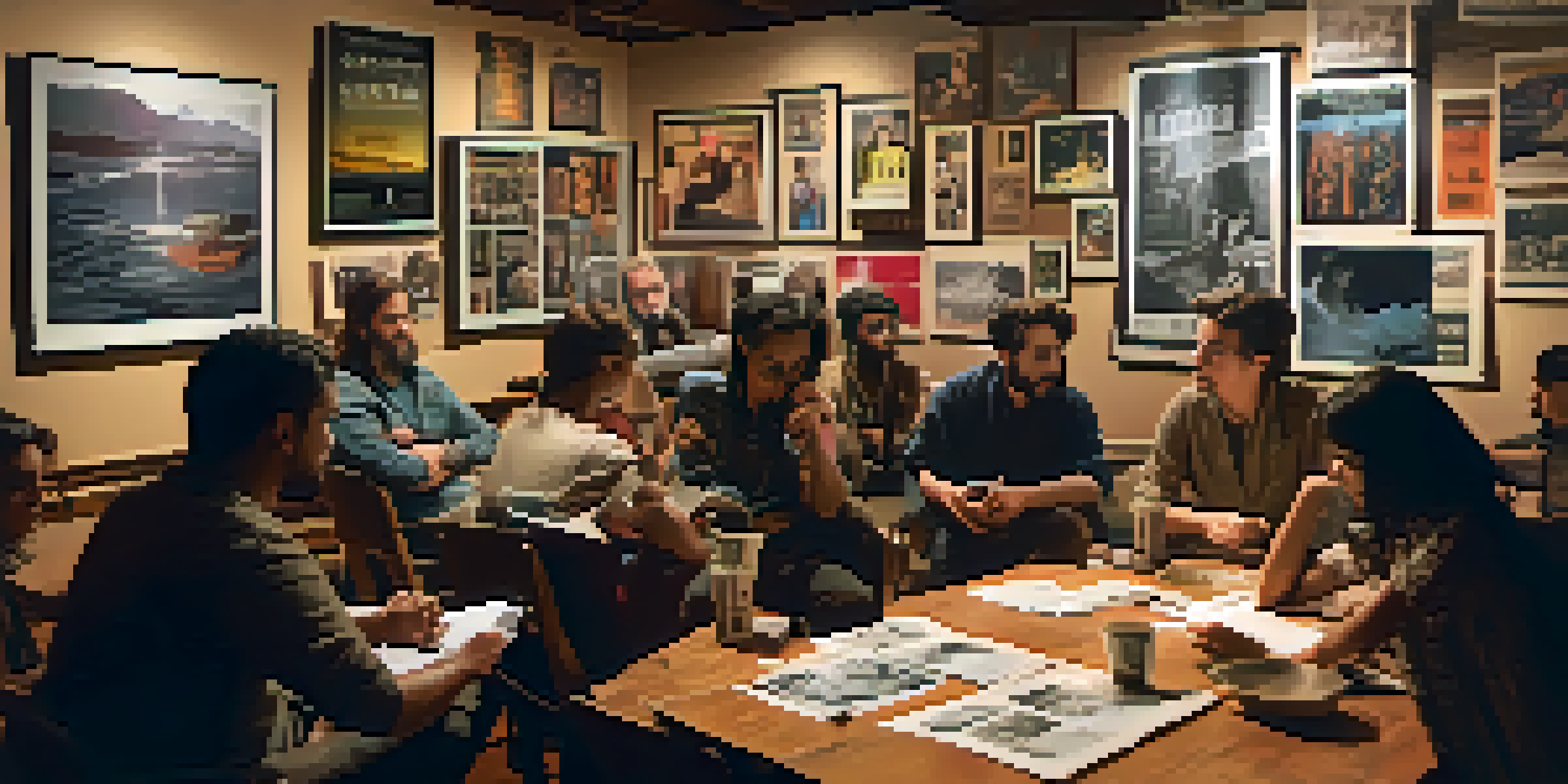The Role of Film Critique in Developing Critical Thinking

Understanding Film Critique and Its Purpose
Film critique is the analysis and evaluation of films, encompassing elements like narrative, cinematography, and performances. The purpose of film critique goes beyond simply stating whether a film is 'good' or 'bad'; it encourages viewers to engage deeply with the content. By examining the film's themes, messages, and artistic choices, critics aim to foster a richer appreciation of cinema.
The cinema is a mirror by which we often see ourselves.
This process invites audiences to reflect on their own interpretations and emotional responses. For instance, a critique might explore how a film addresses social issues, prompting viewers to think critically about those topics. In this way, film critique serves as a bridge between entertainment and education, helping us to engage with complex ideas.
In essence, film critique is not just about opinions; it's about sparking conversations and critical discussions that can lead to a better understanding of both film and the world around us.
Critical Thinking: What Is It and Why It Matters
Critical thinking involves the ability to analyze information, evaluate different perspectives, and make reasoned judgments. It’s a skill that is increasingly important in our information-saturated world, where being able to discern fact from opinion is crucial. By developing critical thinking skills, individuals become better equipped to navigate complex issues and make informed decisions.

In the context of film, critical thinking allows viewers to assess not just the storyline, but also the underlying messages conveyed by the filmmakers. For example, when watching a documentary, a critical thinker would question the sources of information presented and the potential biases involved. This level of scrutiny can lead to more meaningful insights and discussions.
Film Critique Enhances Engagement
Analyzing films encourages deeper viewer engagement and reflection on themes and messages.
Ultimately, critical thinking empowers us to challenge assumptions, consider alternative viewpoints, and articulate our thoughts clearly—skills that are invaluable in everyday life.
How Film Critique Fosters Critical Thinking Skills
Engaging with film critique encourages viewers to analyze narratives and characters in depth, thereby sharpening their critical thinking abilities. When a person articulates their thoughts on a film, they practice evaluating various aspects such as plot structure, character development, and thematic relevance. This analytical process mirrors the critical thinking method of breaking down complex ideas into manageable parts.
Critical thinking is the key to creative problem solving in business.
Moreover, discussing films with others—whether in a classroom setting or a casual movie night—opens the door to diverse opinions and interpretations. These conversations can challenge our own views and prompt us to consider perspectives we might not have thought of otherwise. By navigating these discussions, we enhance our ability to argue, defend, and adapt our viewpoints.
In this way, film critique becomes a fertile ground for cultivating critical thinking, as it requires us to not only consume media but also engage with it thoughtfully.
Film Critique as a Tool for Empathy Development
One of the most significant benefits of film critique is its potential to foster empathy. When we analyze films that portray different cultures, experiences, or social issues, we are invited to step into the shoes of others. This practice of perspective-taking is fundamental to developing empathy, which is a key component of critical thinking.
For instance, watching a film that deals with mental health issues might encourage viewers to reflect on their own understanding of the topic and consider how society treats those who struggle with such challenges. In critiquing the film, individuals can question stereotypes and advocate for more accurate representations, thereby promoting empathy and social awareness.
Critical Thinking Through Film
Film critique fosters critical thinking by prompting viewers to evaluate narratives and perspectives.
Thus, film critique not only sharpens our analytical skills but also enables us to connect with and understand diverse human experiences, enriching our overall worldview.
The Role of Context in Film Critique and Thinking
Context plays a crucial role when evaluating films, as it shapes our understanding of the story and its characters. Factors such as the time period, cultural background, and the filmmaker's intent can significantly influence how a film is perceived. By considering these elements, viewers can cultivate a more nuanced approach to critique.
For example, a film made in the 1950s may reflect societal norms and values that differ greatly from today’s perspectives. Recognizing these differences allows critics to engage in deeper discussions about how films both reflect and challenge cultural narratives. This awareness is a vital aspect of critical thinking, as it requires us to place information within its broader context.
In this way, understanding the context not only enriches our film critique but also enhances our critical thinking skills, as we learn to consider multiple layers of meaning.
Developing a Critical Eye Through Film Education
Film education, whether through formal classes or self-study, is a powerful means of honing critical thinking skills. By learning about film theory, genre conventions, and directorial styles, individuals can develop a more discerning eye when watching movies. This educational journey encourages viewers to ask questions and explore their own interpretations.
Additionally, participating in film discussions or writing critiques can provide practical experience in articulating thoughts and opinions. This practice not only reinforces critical thinking but also builds confidence in expressing ideas clearly and effectively. For example, a workshop that focuses on analyzing classic films can inspire participants to explore deeper themes and make connections to real-world issues.
Empathy Development via Film
Critiquing films that explore diverse experiences helps cultivate empathy and social awareness.
Ultimately, engaging with film education cultivates a lifelong appreciation for cinema while sharpening our analytical and critical thinking skills.
Conclusion: Embracing Film Critique for Lifelong Learning
In conclusion, film critique plays a vital role in developing critical thinking skills that are essential for navigating today's complex world. By encouraging us to analyze, reflect, and engage with diverse perspectives, film critique enhances our ability to think critically and empathetically. This process is not just beneficial for film enthusiasts; it has far-reaching implications for how we approach information in all areas of life.
As we embrace the art of film critique, we become more informed consumers of media, better equipped to challenge assumptions and understand the world around us. The skills we develop through engaging with film can be applied across various contexts, fostering a culture of critical inquiry and thoughtful discussion.

So, the next time you watch a film, consider taking a moment to critique it. You might just find that you’re not only enjoying the movie more but also sharpening your critical thinking skills along the way.